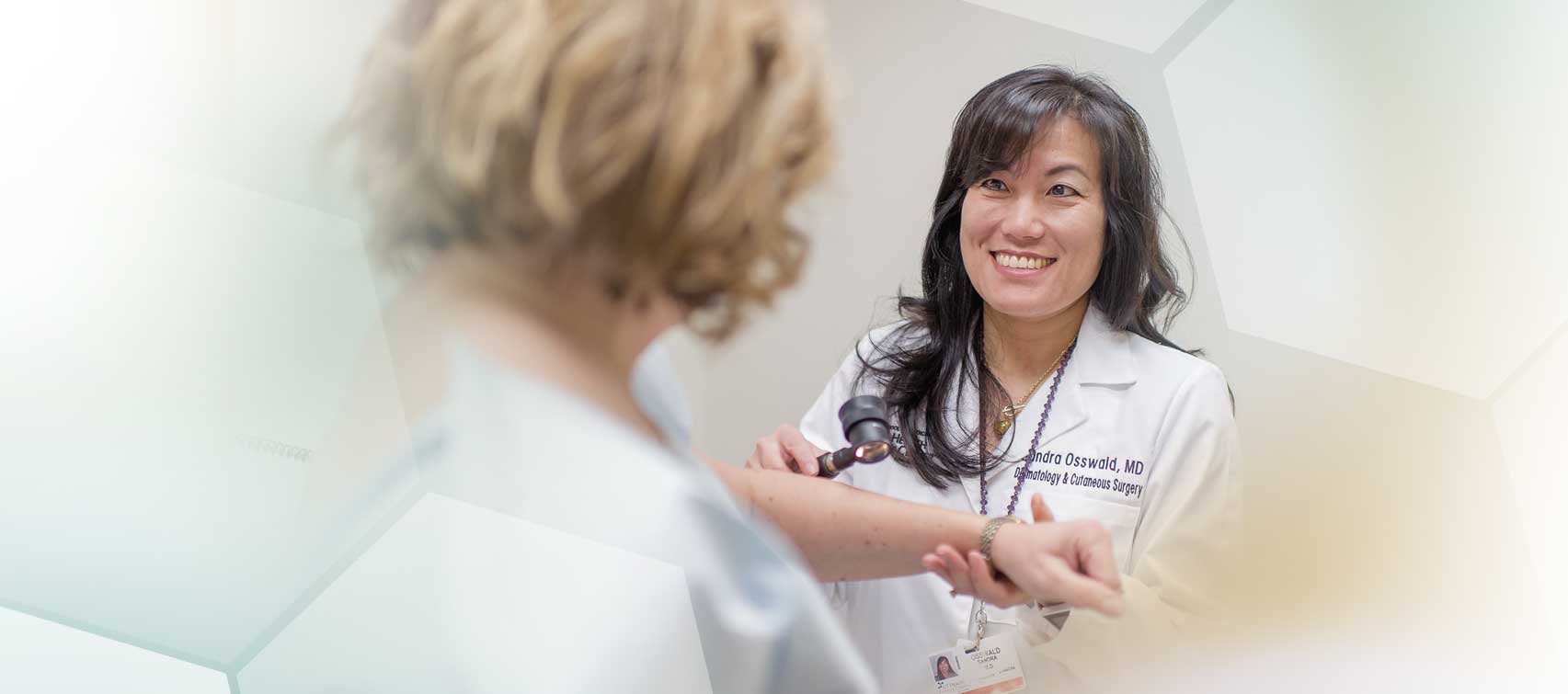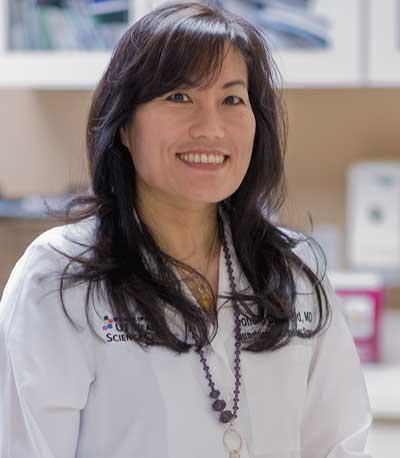Sandra Osswald, M.D., chief of the Dermatology Clinic for UT Medicine San Antonio, didn’t have far to look for her inspiration in pursuing a career in medicine.
Her mother spent the majority of her career as a prominent cytogenetic researcher at the National Institutes of Health. Her “retirement” years now consist of working as an oncologist in Taiwan.
“My parents came here from China. I was born in the District of Columbia and grew up in Rockville, Maryland,” Dr. Osswald said. “My mother was a doctor who worked very hard. She planted that first seed in me about growing up and being a doctor. My sister is a doctor too.”
She chose to attend a six-year bachelor/medical degree program through the School of Medicine at Boston University. She went to school on a U.S. Air Force scholarship. Dr. Osswald completed her internship and residency in internal medicine at Keesler USAF Medical Center in Biloxi, Miss. She later worked as an internist and flight surgeon at Brooks Air Force Base in San Antonio.
Finding a love of dermatology
During her residency in internal medicine, Dr. Osswald did a rotation in dermatology, and she loved it. When her military career permitted, she did a second residency in dermatology.
“I was able to do my dermatology residency at Wilford Hall and what is now called the San Antonio Military Medical Center or SAMMC,” she said. “When I completed my residency, I was fortunate to stay on as faculty. I found I enjoyed teaching too.”
As a dermatologist, Dr. Osswald learned she had an affinity for dermatopathology, which is the joint specialty of dermatology and pathology. It involves studying diseases at a microscopic and molecular level and analyzing potential causes of skin diseases.
She completed a postdoctoral fellowship in dermatopathology at the Armed Forces Institute of Pathology in Washington, D.C. Her military career then brought her back to San Antonio, where she served as chair of the Department of Dermatology at Brooke Army Medical Center.
Retiring from the military
After 20 years of active military service, Dr. Osswald retired in 2009 as a full colonel. Eric Kraus, M.D., then chief of the Division of Dermatology and Cutaneous Surgery at the UT Health Science Center San Antonio, asked her to be his successor. At that time, the division’s Dermatology Clinic was located at the Texas Diabetes Institute. With the building of the Medical Arts & Research Center and expansion of the Cancer Therapy & Research Center (CTRC), a sizable space opened up in the Grossman Building at the CTRC, 7979 Wurzbach Road.
“We wanted to create a program for all dermatology patients. The space at the CTRC was renovated for our growing clinical practice so that we could have a medical and surgical area and space for our residents,” she said.
While located at the CTRC, which is a part of the UT Health Science Center, the Dermatology Clinic falls under UT Medicine San Antonio, which is the clinical practice of the university’s Long School of Medicine.
Caring for all kinds of dermatology issues
“We have a full-service dermatology clinic for adults and children. We diagnose and treat those with skin cancer,” she said. “Our surgical team specializes in Mohs micrographic surgery. This is a precise technique that can remove skin cancers while causing as little damage as possible to healthy tissue.” The team treats all conditions of hair, skin and nails, including conditions such as eczema, contact dermatitis, psoriasis, blistering conditions, and also performs cosmetic and laser procedures.
“I am really proud of our Dermatology Clinic. What I have here, I had in the military. I have a team dedicated to patient care, quality care and a team approach,” she said. “We are part of UT Medicine so we are able to offer patients comprehensive care. I am able to see how our other physicians are helping my patients, and we can coordinate their care.”
In addition to caring for patients, Dr. Osswald said she enjoys teaching medical students and residents. She serves as a mentor to many medical students.
“I love having the opportunity to teach here,” she said. “As a dermatopathologist, I look at all the biopsies from the clinic and our other sites. We review and discuss each diagnosis and treatment. I meet each Wednesday with our residents to review slides. Correlating the patient’s clinical condition with their pathology is a skill we teach our dermatology residents to help them become better clinicians. This is a skill they must have before they graduate.”
Dr. Osswald said she can’t ask for more: She gets to teach students, treat patients, do pathology, and work with an incredible team in the Dermatology Clinic. And, while she is doing all this, she is making lives better.

